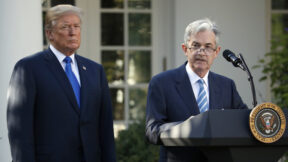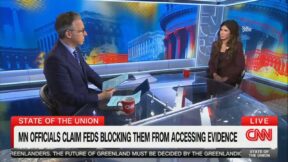Tony Dokoupil Is Being Ritually Humiliated for Asking the Wrong Person the Wrong Questions

CBS News admonished morning show host Tony Dokoupil for committing one of the cardinal sins of modern journalism on Monday: Asking the wrong questions of the wrong person.
In a recent interview with Ta-Nehisi Coates about his new book, The Message, Dokoupil did not pay homage to Coates with compliments-disguised-as-questions in the way that his co-host Nate Burleson did when he observed that Coates says “this book is written specifically for writers, stating that the task for young writers should be nothing less than changing the world.”
“Why do you feel like writers should bear that responsibility?” inquired Burleson.
“Saving the world, just to be really specific,” Coates corrected him.
Dokoupil was supposed to pad Coates’s savior complex. After all, to America’s coddled, ideologically monolithic elite class, the author of the “The Case for Reparations” and Between the World and Me is at the very least a prophet.
Coates’s best trick — the one that’s made him rich and influential — is that he tells this cohort what they want to hear. Namely, that they’re not only “right,” but just. Their lesser opponents, meanwhile, are not only “wrong,” but evil.
In The Message, Coates identifies champions of the Palestinians and their champions as the betters and friends of Israel as the lessers. As The Free Press’s Coleman Hughes noted in his apt review of the book, Coates’s over 100-page essay on the topic doesn’t include so much as an acknowledgment of the Palestinian terrorism — or larger Islamic world’s persecution of the world’s only Jewish-majority state — that have shaped modern Israel. The tale he set out to tell was much simpler and more satisfying to those who already share his perspective.
Dokoupil, as a journalist, set out to interrogate this perspective with what little time had had to discuss it with Coates — and he did so respectfully.
He began by praising Coates as a “very talented, smart guy,” but also confronted him with his own evaluation of Coates’s work, noting that he thought it “would not be out of place in the backpack of an extremist.” That’s a tough assessment, but it’s one Dokoupil backed up by enumerating The Message‘s manifold omissions.
“Why leave out that Israel is surrounded by countries that want to eliminate it?” he asked. “Why leave out that Israel deals with terror groups that want to eliminate it? Why not detail anything of the first and the second intifada — the cafe bombings, the bus bombings, the little kids blown to bits? And is it because you just don’t believe that Israel, in any condition, has a right to exist?”
“Well, I would say the perspective that you just outlined, there is no shortage of that perspective in American media,” replied Coates coolly.
Before a writer can save the world, they have to know how to use words correctly. What Dokoupil had outlined was not a “perspective,” they were cold, hard facts that public intellectuals owe it to their audience to account for.
Here were the other questions Dokoupil directed at him:
“If you were to read this book, you would be left wondering, ‘Why does any of Israel exist? What a horrific place, committing horrific acts on a daily basis.’ So I think the question is central and key if Israel has a right to exist. And if your answer is no, then I guess the question becomes, ‘Why do the Palestinians have a right to exist?’ Why do 20 different Muslim countries?”
“You write a book that delegitimizes the pillars of Israel. It seems like an effort to topple the whole building of it. So I come back to the question, and it’s what I struggled with throughout this book. What is it that so particularly offends you about the existence of a Jewish state that is a Jewish safe place and not any of the other states out there?”
“Why is there no agency in this book for the Palestinians? They exist in your narrative merely as victims of the Israelis, as though they were not offered peace at any juncture, as though they don’t have a stake in this as well. What is their role in the lack of a Palestinian state?”
At one point, Dokoupil interceded on Coates’s behalf when a colleague attempted to retake the floor, urging him to lay out his argument in full. This was journalism at its best, conversation informed at presenting an audience with both sides of what is a contentious issue.
The network’s Jan Crawford said it best during an editorial call in which Dokoupil was ritually humiliated for not living up to CBS’s “standards”: “I thought our commitment was to truth.”
“When someone comes on our air with a one-sided account of a very complex situation, as Coates himself acknowledges that he has, it’s my understanding that as journalists we are obligated to challenge that worldview,” she added. “That is what Tony did. He challenged Coates’s worldview, his one-sided worldview, Coates got to respond. It was civil.”
CBS hasn’t produced any evidence Dokoupil said anything false because he didn’t. It hasn’t pointed to unprofessional conduct because nothing he did was unprofessional. Management’s unspoken submission is that his failure to simply acquiesce before the great Ta-Nehisi Coates is what didn’t conform with their standards.
And on that count, they’re right.
This is an opinion piece. The views expressed in this article are those of just the author.





Comments
↓ Scroll down for comments ↓